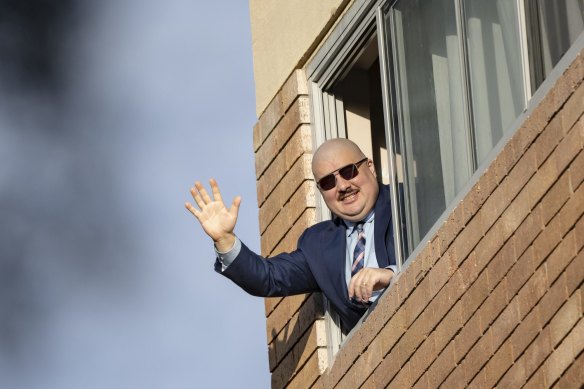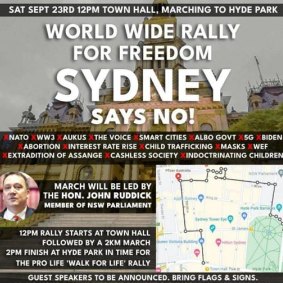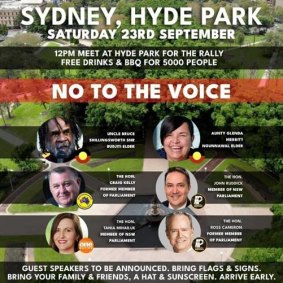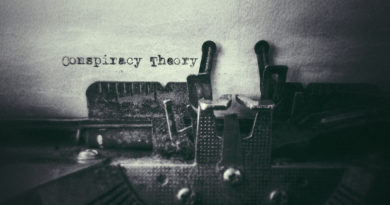Anti-Voice rallies organised by pro-Putin conspiracy theorist
Rallies opposing the Indigenous Voice to parliament planned around Australia this weekend are being organised by a pro-Kremlin activist and anti-vaccination campaigner living in the Russian consulate in Sydney.
The official No campaign has distanced itself from the latest iteration of the “world freedom rallies”, which have long been organised by Simeon Boikov, who is also known online as “the Aussie Cossack”.

NSW Liberal Democrat MP John Ruddick says Putin sympathiser Simeon Boikov (pictured) has been important in organising a No rally in Sydney this weekend.Credit: Wolter Peeters
While posters for the rallies were originally framed around opposing Australian aid to Ukraine and an array of conspiracy theories, they have now been rebranded as anti-Voice events and are expected to draw crowds in the thousands.
A spokesman for the major No outfit, Fair Australia, said the events scheduled for Saturday were “not supported, endorsed or funded by us in any way”.
“We expect there will be many grassroots events and organisations springing up in communities across the country in opposition to the divisive Voice and that is understandable,” the spokesman said in a written statement.

The original poster for Saturday’s rally.
The rallies – scheduled in Sydney, Melbourne, Perth, Adelaide and Canberra as well as regional centres such as Casino in NSW and Yeppoon in Queensland – could further escalate tensions over the referendum after footage emerged on Tuesday of protestors calling Liberal senator Alex Antic a “racist dog” as he entered a No event in Adelaide.
Prime Minister Anthony Albanese called for civility while Opposition Leader Peter Dutton said the vision was disturbing.
“Of course some of the tone of the debate has been unfortunate, that’s the truth,” Albanese said. “What I would say to people is: be respectful. I respect every Australian regardless of whether they’re going to vote Yes or whether they’re going to No.”
NSW Liberal Democrat MP John Ruddick, who will speak at the Sydney No rally, said Boikov had played an important role in organising logistics for the event.

The updated poster for Saturday’s rally.
“We’re very lucky to have him,” Ruddick said.
But Ruddick said he was “horrified” that he had initially been promoted as speaking at a rally listing the Voice as just one of 16 issues of concern including the “indoctrination of children”, AUKUS, abortion, and the extradition of WikiLeaks founder Julian Assange. Other topics listed allude to popular conspiracy theories over 5G technology and the World Economic Forum.
Ruddick said it was “absolutely muddying the waters” on the referendum.
“This is a single issue referendum; we don’t want it merging with all the other stuff,” he said.
“We will not be discussing the Ukraine war, COVID, digital currency – none of that will be on the agenda, none of that will be spoken about from the platform.”
But Boikov, an outspoken advocate of Russia’s invasion of Ukraine, said he expected the event to highlight topics other than the referendum.
“We don’t want people to forget about all the other issues,” he said. “We’re saying no to the Voice, but the Voice isn’t something that cancels out all the other grievances that we have with the government.”
During the pandemic, Boikov expanded his following through the sovereign citizen and anti-vax movements. He now regularly invites Indigenous sovereign groups to perform Welcome to Country ceremonies at his pro-Russia rallies, claiming that all Indigenous Australians support the invasion of Ukraine.
Indigenous groups have held recent events at the Sydney Russian consulate, where Boikov has been holed up since December to avoid jail time for assaulting a 76-year-old man at a rally in support of Ukraine at Sydney Town Hall.
Last month, Boikov took a poll on his Telegram channel inviting followers to vote on which issue the freedom rallies should focus on next, suggesting everything from “NO to the Voice” to “NO to NATO”.
The Svoboda Alliance – Russians in Australia who oppose Putin’s invasion of Ukraine – said pro-Kremlin influencers were “using First Nations people to promote their messages”.
“Looks like the Kremlin believes that voting No will undermine the Labor Party and the prime minister,” Alliance spokesman Ilya Fomin said.
Eddie Synot, a Wemba Wemba lawyer and researcher, said No campaigners’ use of conspiracy theories was causing damage to First Nations people. “Once again, our communities, the most disadvantaged in this country, are ignored and used by others for their own purposes,” he said.
A recent analysis of the debate on X (formerly Twitter) by Queensland University of Technology researcher Timothy Graham suggests conspiracy theorists are increasingly infiltrating the No campaign online.
While neither side appeared to be deploying armies of bots, Graham said the No camp had many more “suspicious accounts” and was dominated by misinformation and conspiracy theories.
The Voice debate ticks all the boxes for a foreign adversary looking to sow division in Australia, he said. “It’s about race; it’s polarised. They look for any fissure, any crack, to make it worse.”
When the Black Lives Matter movement took off in the US, researchers discovered Russia had waged a covert and sophisticated campaign to inflame division.
Isabella Currie, an expert in Russian information warfare, said she hadn’t found conclusive evidence Russia was running a formal campaign in the Voice debate.
But she said Russia had previously tried to “exploit genuine anti-imperialist and anti-Western sentiments”, including in the 2016 US presidential election.
Cut through the noise of federal politics with news, views and expert analysis. Subscribers can sign up to our weekly Inside Politics newsletter.
Most Viewed in National
This article has been archived for your research. The original version from Sydney Morning Herald can be found here.


